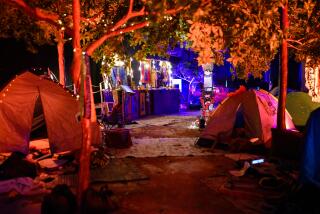Where Is God? God Is in the Rubble
God had a bad week last week. The killers’ religious teaching has proclaimed the United States the Great Satan and excluded America from an essential teaching of the Koran that says human beings were created in the divine image. Because they use God’s name as justification to kill, we should be deeply reluctant to invoke that name.
So we are left in numb shock. How can a just God permit such wanton acts of evil?
As one who has wrestled with the issue of how we speak of God and to God in the aftermath of the Holocaust, permit me some observations. Clearly, the two events are not comparable, but the study of the Holocaust may shed some light on how to deal with the implications of other events.
With due apologies to my fellow believing Jews at the High Holidays, which annually proclaim God as merciful judge, we cannot easily proclaim God’s justice--not at this moment, not after this event. The randomness of the victims precludes this.
There is a difference between tragedy and atrocity. In tragedy, what is learned to some degree balances the price that is paid for such knowledge. Atrocity offers no such possibility and thus no inner space to bury the event. At most, it leaves those left behind searching the ashes to find some meaning to an event of such magnitude that it defies our very sense of meaning.
The attacks on the World Trade Center and the Pentagon, like the Oklahoma City bombing before them, were not tragedies but atrocities. The people of Oklahoma City could find little closure to their suffering after the execution of Timothy McVeigh because of the imbalance between the magnitude of the crime and the limited justice that could be achieved. Likewise, the capture of the terrorists and their organizers and the military actions that are promised will offer no closure to the World Trade Center and Pentagon bombings. Yet we are forced by the nature of our religious traditions to ask, where was God? God is not to be found in the acts or in the choice of the victims. God is to be found in the rubble.
God is love--the love that led people to assist one another in escaping and the dedication that led fire officials and police officers to enter burning buildings to save lives. Some of those who escaped experienced love when they reached out to one another. Some of those who died experienced the God of love when they called those whom they loved to say final goodbyes, to share some final thoughts. And the embrace of love that united a country also is an expression of that God of love.
The fabric of our society has been rent; the very nature of our lives has been torn asunder. If there is to be healing, God will be found amid the ruins. Harold Schulweis, the sage rabbi of Encino, wrote of God as a predicate. When we say God is love, we mean that loving is godly. When we say that God is just, we also mean that doing justice is godly.
I know that I have learned more about humanity than divinity in my study of the Holocaust. I have learned to live religiously with questions about God. I have learned to live compassionately with anguish about humanity.
Those who survived last week will suffer not only from what psychiatrists have called post-traumatic stress syndrome but also from what has become known as survivor guilt. It is a paradox of the Holocaust that the innocent feel guilty and the guilty feel innocent.
I suspect that the perpetrators of this atrocity are sleeping well at night. Perhaps they are afraid of getting caught, perhaps of being bombed back to the Stone Age, yet I doubt that their sleep--unlike mine--is interrupted by nightmares of victims’ screams and the cries of families left behind. The innocent--the men and women who escaped the burning buildings, the spouses, parents and children who have lost their mates, their descendants and their parents--are gripped by guilt. It is natural for them to ask, why did I survive? Was I more worthy?
To this, there is no answer. No one survived the World Trade Center or the Pentagon because of his or her virtue, strength or wisdom. Most often, survival was random.
The question is what to do with the very fact of survival. Here the experience of Holocaust survivors may be instructive. In the immediate days ahead, the task of going on with life will be all-consuming. It will take time energy. Shock will be replaced by numbness and depression. There will be persistent fears. But over time, survivors will be able to answer that question not by a statement about the past but by what they do with the future.
Because they have faced death, many will have learned what is most important: Life itself, love, family and community. The simple things we have all taken for granted will not be taken for granted. They will be treasured and appreciated anew and the survivors will bear witness to that reality.
The survivors of the World Trade Center and Pentagon bombings will not be defined by the lives they have led until now but by the lives that they will lead from now on. For the experience of near death to have ultimate meaning, it must take shape in how one rebuilds from the ashes. Such for the individual; so too, for the nation.
More to Read
Sign up for Essential California
The most important California stories and recommendations in your inbox every morning.
You may occasionally receive promotional content from the Los Angeles Times.










